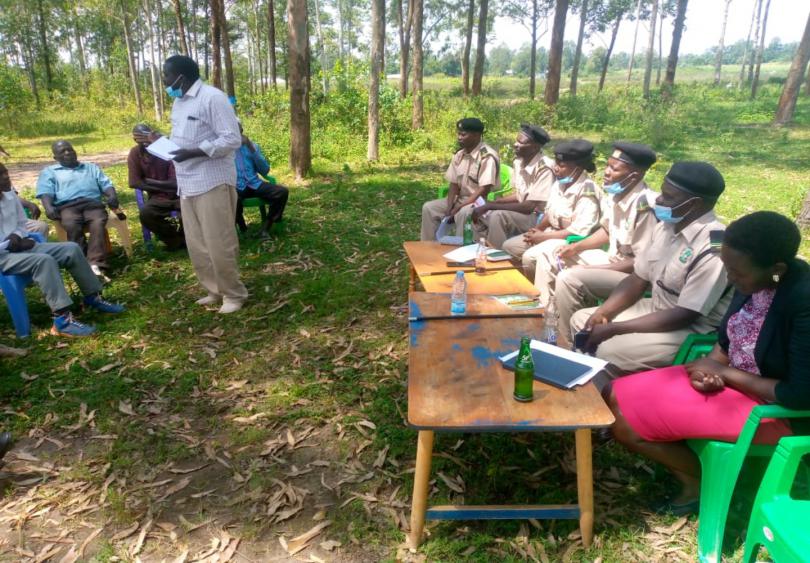NUTRITION CHAMPIONS BRING NUTRITION TO THE FOREFRONT IN THREE KENYAN COUNTIES

Nutrition champion holding her young child. Photo Credit: Rael Mwando, Kisumu County Department of Health
By Emily Teshome, Nutrition Sensitive Advisor, Joyce Nyaboga, Capacity Strengthening Advisor, Peter Milo, Chief of Party, Kenya
We have made great progress to reduce malnutrition in Kenya over the past decade but COVID-19 has set us back by aggravating the prevailing triple burden of malnutrition—the coexistence of undernutrition, micronutrient deficiencies, and overweight and obesity. Hence, maintaining commitment is an ongoing challenge.
For a long time, nutrition issues and programming were perceived to be a Ministry of Health (MOH) issue, but we know malnutrition is multicausal and requires multiple interventions to mitigate. Galvanizing support across sectors is critical. Nutrition champions are influential people, like community leaders or politicians, who are in a unique position to use their positions and platforms to shape nutrition as a priority from local to global levels. These influencers voice the needs of their communities and contribute to galvanizing political and community attention toward improving nutrition from the national down to the smallest administrative unit, in this case the wards and the villages in Kenya’s Kakamega, Kisumu, and Kitui counties.
USAID Advancing Nutrition, through the existing multi-sectoral nutrition (MSN) platform in Kenya, has initiated a sector-wise nutrition champion approach and operationalized it to include various ministries, including education, health, water, social protection, and agriculture. This helps ensure that all sectors involved with nutrition-sensitive programming are collectively advocating for evidence-based nutrition issues for positive change and moreover for increased resource mobilization and allocation from county governments and stakeholders.
The Director of Nutrition and Dietetics Services in the MOH, Veronica Kirogo, has expressed excitement about the novel MSN champion approach and recommends that it be rolled out in the other counties in Kenya. The Chief Officer in Kakamega County in the Department of Social Services, Youth, Sports, and Culture, Dr. Brenda Barasa, lauded the approach to engage champions across sectors and views it as an apt course of action for vulnerable groups to receive nutrition-related messages and be better informed for a more comprehensive approach to better health.
In Kisumu, the county’s First Lady Dorothy Nyong’o is a well-known nutrition champion. Her passion to improve nutrition has helped ensure a budget line for subprogram for nutrition is included in next year’s forecast. Similarly, in Kakamega, the outgoing county’s First Lady, Priscilla Oparanya, is passionate about advocating for increased resource allocation for nutrition, food production, and MIYCN or those living in low income areas in the county. Both First Ladies are instrumental in sharing their advocacy experiences through mentorship with the sector-wise nutrition champions to equip them in lobbying for increased resources for nutrition-specific and nutrition-sensitive interventions.

Nutrition class with administrative leaders. Photo Credit: Catherine Moraira, USAID Advancing Nutrition
So far, in Kenya we have facilitated the identification and training of 61 nutrition champions across Kakamega, Kisumu, and Kitui counties. The champions are a mix of male and female and of different ages, professions, persons with disability, media experience, and administrators/chiefs. In partnership with county governments and academic institutions such as Masinde Muliro University of Science and Technology in Kakamega and Maseno University in Kisumu, we facilitated the development of guidelines including a sector-wise TOR for county and sub-county levels that outlines the champions’ scope and responsibilities and advocacy messages for MSN sectors as well as adopted a comprehensive training package from existing nutrition champion curricula.
Ultimately, the sector-wise nutrition champions that are linked to the civil society organizations and work closely with the local leaders are envisioned to be the “voice of the communities” for improved nutrition outcomes. Nutrition champions’ advocacy for government support to increase resource allocation towards nutrition interventions not only benefits their own nations, but their efforts can inspire other countries that are part of the SUN Movement.




